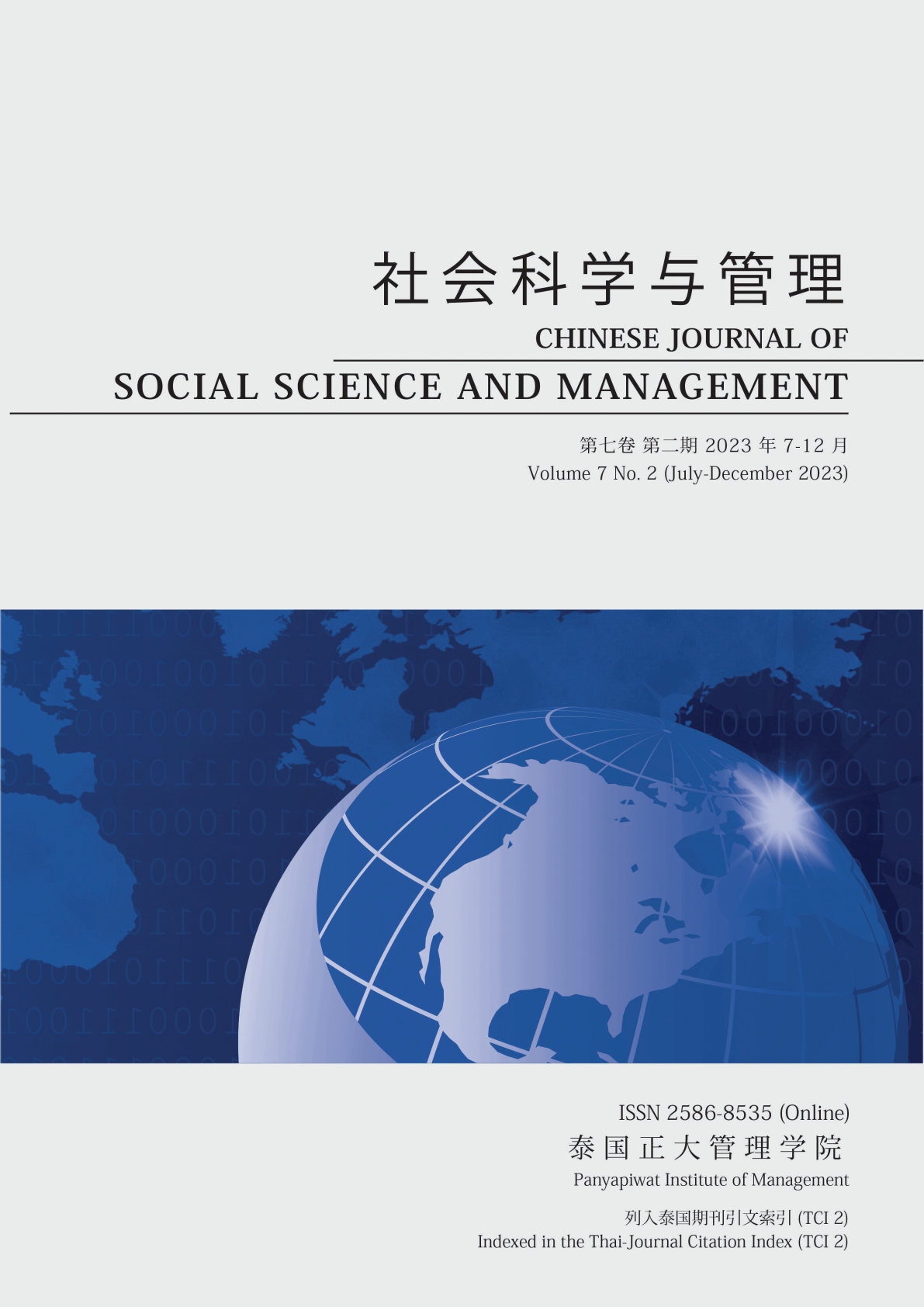THE INFLUENCE OF NEW GENERATION EMPLOYEES’ SOCIAL NETWORK ON MEANINGFULNESS OF WORK FROM CAREER AND SOCIAL IDENTITY PERSPECTIVES
Main Article Content
Abstract
The lack of a sense of meaning at work among the new generation of employees, the natives of the Internet born post-1995, has become a common problem for managers around the world. Based on social network theory and self-determination theory, this article explores the mechanism of influence of the new generation employees’ social network on the sense of meaning at work. The hypothesis verification results were obtained by issuing questionnaires to 414 new generation employees in major cities in China and analyzing the sample data using SPSS and AMOS software. The results indicate that the social network of new generation employees has a significant positive influence on the sense of meaning at work, professional identity plays a partly mediating role in the social network of new generation employees and the sense of meaning at work, and social identity moderates the positive relationship between the social network of new generation employees and the meaningfulness of work. The findings of this paper provide implications for the management practices of new generation employees in China, Thailand and other countries.
Article Details

This work is licensed under a Creative Commons Attribution-NonCommercial-NoDerivatives 4.0 International License.
Chinese Journal of Social Science and Management Editorial Division
The Office of Research and Development, Panyapiwat Institute of Management
85/1 Moo 2, Chaengwattana Rd., Bang Talat, Pakkred, Nonthaburi 11120, Thailand
Tel. 02 855 01048 E-mail: cjssm@pim.ac.th
References
Ashforth, B. E., & Kreiner, G. E. (1990). How can you do it? Dirty work and the challenge of constructing a positiveidentity. Academy of Management Review, 24(3), 413-434.
Ashforth, B. E., & Mael, F. (1989). Social identity theory and theorganization. Academy of Management Review, 14(1), 20-39.
Bai, J., & Wang, M. L. (2020). The impact of empowered leadership on creativity: A sense of work meaning perspective. East China Economic Management, 20(7), 109-117. [in Chinese]
Bian, Y. J., & Zhang, W. H. (2001). Economic system, social network and occupational mobility. China Social Science, 2(2), 77-206. [in Chinese]
Cheek, J. M., Smith, S. M., & Tropp, L. R. (2002). Relational identity orientaion: A pourth scale for the AIQ. Savannah, Ga.
Granovetter, M. S. (1973). The strength of weak ties. American Journal of Sociology, 78(6), 1360-1380.
Hampton, K. N., Sessions, L. F., & Her, E. J. (2011). Core networks, social isolation, and new media: How Internet and mobile phone use is related to network size and diversity. Information, Communication & Society, 14(1), 130-155.
Hou, C. N., Wu. L., & Liu, Z. J. (2014). Self study to the theory of paradigm change and group reference effect experiment. Psychological Science, 14(2), 499-505. [in Chinese]
Johnson, O. L. (2003). The effects of psychological contract breach and orgabizational cynicism: Not all social exchange violations are created equal. Journal of Orgaizational Behavior, 3(24), 627-647.
Lee, D. W. (2020). Professional identity is employee growth drive. http://blog.sina.com.cn/u/7008464341 [in Chinese]
Li, Y. H. (2021). Lectures on organizational behavior. Beijing: New Star Press, 21(1), 46. [in Chinese]
Lin, S. M. (2021). Research on the group work practice of improving the professional identity of the new generation of seafarers [Master’s thesis]. Dalian Maritime University. [in Chinese]
Luo, J. T. (2006). Chinese networking-personal centered trust networks. Relationship Management Research, 6(3), 1-24. [in Chinese]
Luo, J. T. (2010). Handbook of social network analysis. Beijing: Social Science Literature Press, 10(2), 81. [in Chinese]
Luo, T. (2021). Research on the influence of social network on the antiproduction behavior of new generation knowledge employees [Master’s thesis]. Changsha University of Science and Technology. [in Chinese]
Luo, X. (2023). A study on the work significance of female social workers from the perspective of time [Master’s thesis]. Southwestern University of Finance and Economics. [in Chinese]
Matthew, O. J., & Yu, J. (2019). The human network: How your social position determines your power beliefs and behaviors. Beijing: CITIC Press, 19(7), 3-7.
Meng, L., & Ouyang, F. (2019). Dream chaser or screw-up? - Meaningful pursuit reshapes the work experience. Tsinghua Management Review, 10(15), 62-63. [in Chinese]
Mullin, B. A., & Hogg. M. A. (1999). Motivations for group membership: The role of subjective importance and uncertainty reduction. Basic and Applied Social Psychology, 21(2), 91-102.
Podolny, J. M., & Baron, J. N. (1997). Resources and reltationships: Social networks and mobility in the workplace. American Sociological Review of Sociology, 97(24), 57-76.
Rosso, B. D., Dekas, K. H., & Wraesniewski, A. (2010). On the meaning of work: A theoretical integration and review. Research in Organizational Behavior, 10(30), 91-127.
Song, M., Huang, Z. J., & Hu, H. Y. (2018). Research review and future prospects of sense of work meaning. China Human Resource Development, 18(9), 85-96. [in Chinese]
Steger, M. F., Dik, B. I., & Duffy, R. D. (2012). Measuring meaningful work the Work and Meaning Inventory (WAMI). Journal of Career Assessment, 20(3), 322-337.
Stones, R., Yao, W., & Li, N. (2020). Core sociological thinkers. Shanghai People’ s Publishing House, (4), 324-341.
Tajfel, H. (1978). Differentiation between social groups: Studiesin the social psychology of intergroup relations. Academic Press.
Tajfel, H. (1986). The social identity theory of intergroup behavior. Psychology of Intergroup Relations, 13(3), 7-24.
Wei, S. H., & Song, G. W. (2012). Teachers’ career identity and intention to leave: The mediating role of job satisfaction. Psychological Inquiry, 12(12), 564-569. [in Chinese]
We, S. H., Song., G. W., & Zhang, D. J. (2013). The structure and scale of professional identity of primary and secondary school teachers in China. Teacher Education Research, 13(1), 57-59. [in Chinese]
Zhang, Ch. Y. (2015). Career sense of mission: Structure, measurement, and its connection with happiness Chongqing [Doctoral dissertation]. Southwest University. [in Chinese]
Zhao, L. (2014). Study on the professional identity of teachers of ideological and political theory courses in colleges and universities. Educational Academic Monthly, 8(15), 92-96. [in Chinese]


